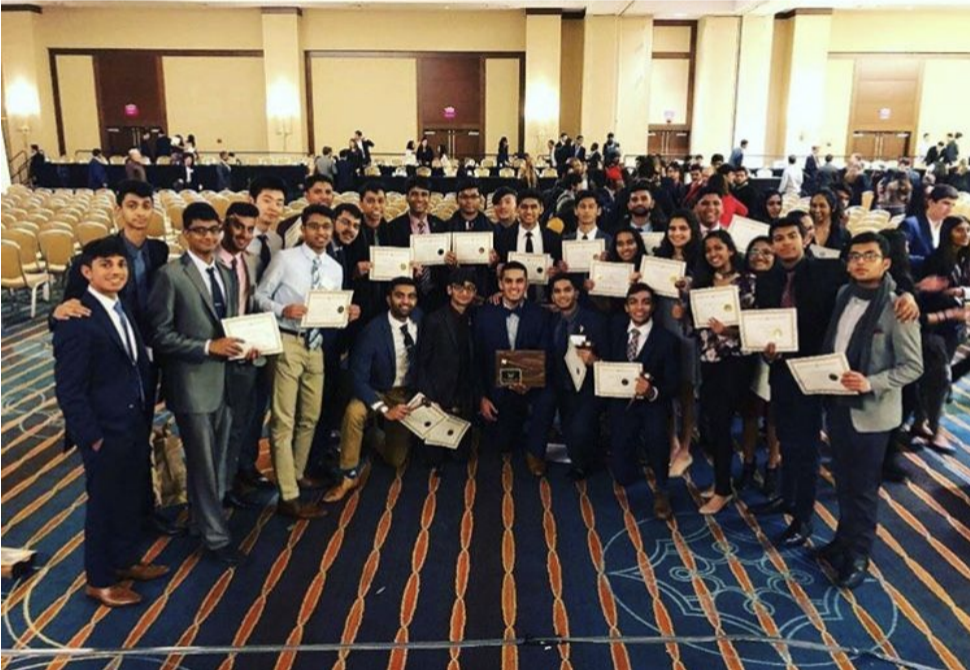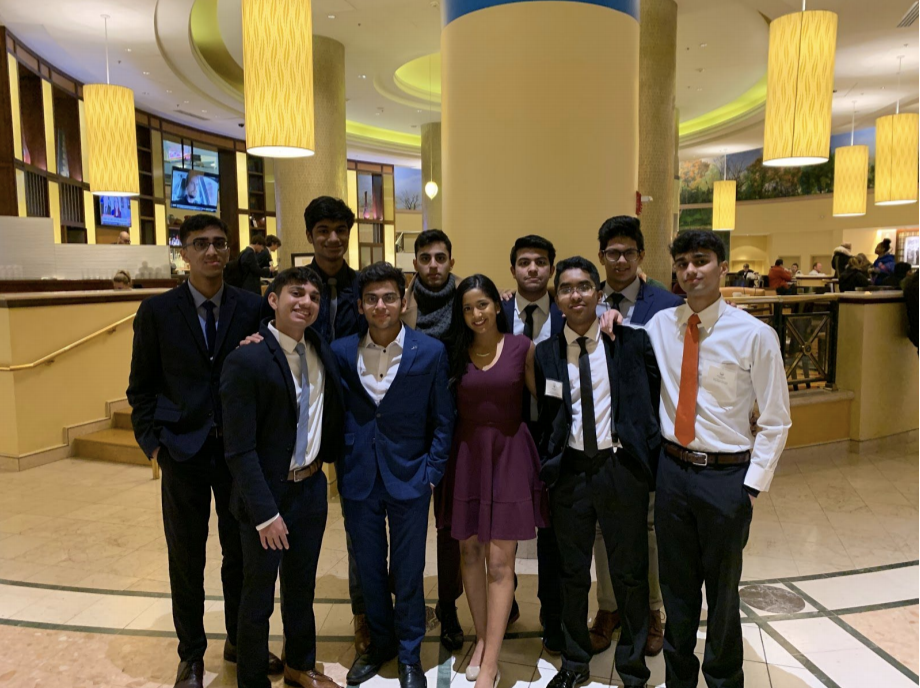JP Stevens Model UN is undeniably a unique community. Year after year we compete at national and international competitions and never fail to leave our mark of excellence, despite coming from a public school located in humble Edison, New Jersey. Every year we teach our delegates to speak stronger, lead prouder, and work harder than everyone around them. But there’s another unique aspect of John P. Stevens Model UN that isn’t quite as positive: we are known for being one of the most male dominated delegations among the circuit.

JPSMUN ILMUNC 2018 Outstanding Large Delegation
Last year we won the coveted Outstanding Large Delegation Award at ILMUNC and after closing ceremonies we had two more gavels than we had girls on the team. Out of the 24 upperclassmen that are considered to be part of our national team, only two are women. Our 2017-2018 secretariat consisted of two secretaries-general and three directors-general — and every single position was filled by a man.
Recently these facts have gotten our team wondering about how we’ve ended up in such a situation. I’ve personally done a lot of thinking and have thought back to some of my very first Model UN meetings in high school. From the very beginning, there were always more boys who showed up to the meetings and who competed at mocks and locals. And slowly but surely, the very few girls who attempted to make their way up the Model UN ladder soon disappeared and before I knew it, I was the only girl left in my grade. It seemed as though the only people who were even capable of making the team or winning national awards were male.
But what I’ve questioned to this day is how come it was always the boys who were more interested in being leaders and speaking up? How come it was always the boys who never lost interest and continued to pursue Model UN? It’s no secret that society has instilled in boys that they should be leaders and that they should command the respect of the people around them, which is why they choose to stick with Model UN. For boys, it is more than just an extracurricular; it is a way for them to show that they are “alpha males.”
I decided to take the time before writing this piece to ask some of the girls who were interested in Model UN earlier in their high school career what it was that made them lose motivation; needless to say, most of the responses I received were pretty disheartening. Many of the girls simply felt that the club was a dead end. Common responses that I heard were that “I don’t think I could be any good” or “It’s just too competitive for me.” A lot of the girls that I talked to decided to pursue clubs such as FCCLA and JPaws (our school club which volunteers at our local pet shelter) instead, which led me to do some more thinking.
The skills which are required for Model UN are often those which are associated with masculinity, which is most likely why girls tend to automatically assume that they do not have the capacity to succeed in a Model UN setting. A lot of girls seem to think that they don’t have it in them to compete with the boys in a club which demands public speaking and leadership prowess. Additionally, the environment of JP itself certainly does not help aid their confidence in the sense that everywhere these girls look — every delegation picture, every Instagram post, every Snapchat story — it is almost always all boys.

JPSMUN Junior Class at ILMUNC 2019
And while some have accepted this tendency as inherent and inevitable, I’ve always believed that I am someone who refuses to take no as an answer, which is why I have been an advocate for some big changes here at JPSMUN. This past year, the JPSMUN E-board along with our advisor have talked a lot about what we can do as a club to ameliorate this situation and change the face of JPSMUN forever. I’ve come up with three main things that each and every Model UN Team around the team is capable of doing:
- Encourage a culture of sisterhood: Often we hear of a “boys’ club” that men tend to create in the professional world, which provides them with networking and mentoring opportunities that are completely out of reach for women. Unsurprisingly, the boys’ club which is apparent in the professional world can be observed in a similar fashion in Model UN. All the “inside jokes” and “all-guy hangouts” certainly allow for boys to create deep connections with each other and develop a strong circle — impenetrable to females. Within these circles, boys train, encourage, and challenge each other to be the best and
provide themselves and each other with every opportunity possible. After wondering for years and years about what I could possibly do to become a part of this “boys’ club,” I realized that the solution lies elsewhere: creating a “girls’ club.” In a club which is so competitive, girl-on-girl competition is common, as even girls sometimes tend to see each other as weak links. It is imperative that we as girls go out of our way to support one and other and take it upon ourselves to train the younger generations of female delegates. Girls, just like boys, want to feel supported and prepared, which is why it is so important to simulate a sisterhood within Model UN that will allow for girls in MUN to not only become part of an extracurricular activity, but a close-knit support group. Looking back at my own Model UN career, I received an overwhelming amount of support from the few other women in the club, which may have been one of the reasons that I chose to stay over many of my peers. - Prepare girls for every unique challenge they’ll face as a delegate: For all women in Model UN, there are certain challenges that we will inherently face and preparing girls for such experiences before hand will certainly ensure that they will have a better Model UN experience as well as a better likelihood of culminating success within the club. Women tend to be shorter and have softer voices than our male counterparts, so it inevitably becomes harder for us to command the attention of a bloc during an unmoderated caucus. Additionally, while loud and strong male delegates are often considered to be
charismatic and good leaders, confident girls are very easily labeled as “bossy” and “aggressive.” Such challenges are likely to deter women from Model UN so it is important that we make each other aware of them as well as prepare each other with how to react in such situations. Knowing that we are at a systemic disadvantage, we must constantly remind each other to stay determined and never forget to project our voices. Personally, if a man is continuously talking over me, another tactic I’ve learned is to allow for other delegates within the bloc to speak. By doing so, I’ve helped to facilitate debate, which not only establish me as a leader, but also creates good relationships with my bloc. When I am labeled “bossy” or “aggressive,” I often look to my co-del or any other ally within my committee to put an end to the gossip and assure to the delegates within my bloc that such allegations are not true. - Separate then recombine: Something which I wish to implement into the JPSMUN training program in the future is to have all-girls’ mocks and training events. By doing so, many of the girls who were initially intimidated by competing with all the boys in the club will have the opportunity to develop their skills before they are placed in such a setting. As a club, we will be able to better prepare women in the club and also get a feel for when they are ready to compete with the rest of the team. Thus, we can ensure that girls will not only be less intimidated, but also that they will feel more supported and better prepared to succeed. Hosting such events will also bring about camaraderie between women in the club.
Ultimately, Model UN has been one of the most important aspects of my high school career and has taught me so much about leadership, speaking, and writing, which is why I wish for more girls in my school to be able to gain all that I have. I think it is imperative for not only JPSMUN, but all teams on the circuit to start thinking about encouraging girls and changing the face of Model UN forever.


